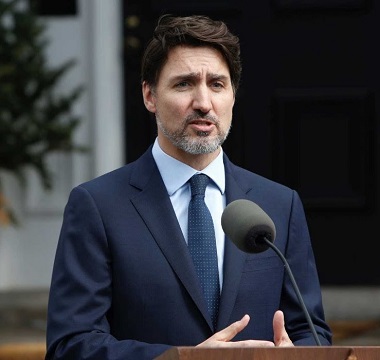
EFC president Bruce Clemenger has written Prime Minister Justin Trudeau about the charitable sector.
The president of the Evangelical Fellowship of Canada (EFC) sent a letter to Prime Minister Trudeau April 7 regarding the recently announced Canada Emergency Wage Subsidy:
The Right Honourable Justin Trudeau
Prime Minister of Canada
Langevin Block
Ottawa, Ontario K1A 0A2
Dear Prime Minister,
We would like to extend our heartfelt thanks for the support extended to charitable and non-profit organizations in the new Canada Emergency Wage Subsidy. This subsidy will provide significant support to many as they work for the benefit of Canadians during these challenging times.
The charitable and non-profit sector is playing a crucial role across Canada. Religious charities foster vibrant social networks, spark local volunteerism, and foster community resiliency. Among our affiliates, for example, many churches and organizations are using technology and creativity to offer social support and the relational connections that are so important to mental health in these anxious times, as well as tangible physical assistance in their local communities such as staffing food banks and other acts of service.
As you know, the charitable and non-profit sector has been substantially affected by the economic impact of the pandemic. The increased wage subsidy will be a significant help to many charities, and we are grateful for this.
However, some charities and non-profit organizations may be unable to demonstrate a 30% shortfall based on a monthly reference period. To address this concern, some flexibility could be built into the wage subsidy program to allow such groups to receive the subsidy now, based on a calculation of their revenue for a six- or twelve-month period that begins March 15, 2020 and compared to the same period in the previous year, with the understanding that:
- if they fail to meet the 30% shortfall threshold, they will pay back a pro-rata amount based on the differential between their actual shortfall and 30%, and
- that this repayment will be made over an agreed-upon time period.
In addition to a wage subsidy for retaining employees, the charitable sector urgently requires support for operations and programs beyond staffing in order to continue to offer meaningful help to Canadians. We ask that you give serious consideration to the following proposals:
1. Matching funds for charitable donations: We ask the government to explore matching charitable donations, and to call on Canadians who are able to help more in these challenging times. Matching funds would help charities meet non-employment related program expenses. Donations could be matched on a month by month basis or be based on the amount received by the charity in the similar period last year.
2. Increased tax incentives: An increase in the charitable tax credit may encourage Canadians who can to donate more. An additional option would be to remove the capital gains tax on donations of real estate or private company shares to charities.
3. Stabilization fund (granting program): In order to enable the sector to complement government services and supports to meaningfully help Canadians, it may be necessary to create a straight granting program to organizations.
Be assured of our prayers for you and your family, as well as your colleagues as you lead Canada through this pandemic.
May God grant you wisdom.

Bruce Clemenger
Yours sincerely,
Bruce J. Clemenger
President, The Evangelical Fellowship of Canada
cc. other party leaders and cabinet ministers
This letter is re-posted by permission. The EFC, in concert with the Canadian Council of Churches and the Canadian Council of Christian Charities, had sent a related letter to the Prime Minister March 24.
Update
Some of the Prime Minister’s April 8 daily comments related to the letter. Following is a portion of a CBC News report pertaining to financial aid, followed by an emailed response (forwarded to me from the EFC) by Bruce Clemenger.
Prime Minister Justin Trudeau said Wednesday the federal wage-subsidy program for employers affected by COVID-19 will have looser requirements than previously announced.
Rather than having to show a 30 percent decline in revenues, he said employers can show a 15 percent decline in March. They can also compare their revenues to previous months rather than the previous year.
The prime minister also announced changes to the Canada Summer Jobs program, which is being reconfigured to match students looking for summer work with industries still hiring during the pandemic. Trudeau said the federal government will pay 100 percent of the wages paid by employers through the program.
Trudeau said the government is working on further measures to financially support self-employed entrepreneurs, small businesses and young people who aren’t eligible for existing emergency financial aid programs like the Canada Emergency Response Benefit.
Bruce Clemenger commented in response to Trudeau’s statements:
We had asked for additional options for qualifying for the subsidy and the government did add an option, though not the specific one we requested. They also lowered the qualifying threshold for March to 15 percent. In addition, the criteria for charities calculating their revenue was amended so that revenue received from governments need not be included. This will help charities that receive government grants.
The changes to the Canada Summer Jobs program will also help those who will receive job grants this year.
The focus of today’s announcement was on employment subsidies. In our letter we had also requested assistance for charities in the area of operations and programs, so that charities will not only be able to retain staff but also carry on their programs.
One idea we suggested was a matching grant to charities based on donations received, similar to what the Canadian government has done in some international relief situations. The government has experience doing this. In matching donations the government is supplementing what Canadians are doing, and it may well encourage those who do not regularly give to charities to begin doing so.
